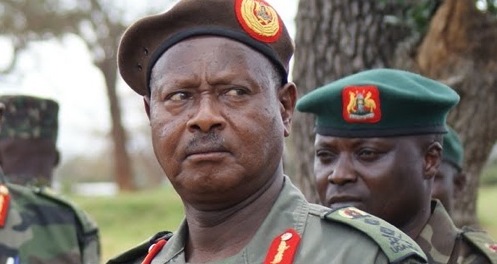Uganda’s Yoweri Museveni
Just over two months after the controversial Public Order Management Act became law with President Yoweri Museveni’s assent, a Ugandan civil society coalition has filed a petition (No. 56 of 2013) challenging the law in Uganda’s Constitutional Court as a violation of their rights to freedom of assembly and freedom of expression among others.
With technical assistance and legal advice from the Robert F. Kennedy Center for Justice and Human Rights (RFK Center), Ugandan attorneys from Onyango & Co. Advocates filed the case today on behalf of: Human Rights Network Uganda (HURINET); the Development Network of Indigenous Voluntary Associations (DENIVA); the Ugandan Association of Women Lawyers (FIDA-U); Member of Parliament Hon. Muwanga Kivumbi; and, retired bishop in the Church of Uganda Bishop Dr. Zac Niringiye.
The impact of the restrictive law has already been felt, with police repeatedly arresting opposition leaders to prevent their public appearances, and some reports indicating that the Ugandan police are now monitoring social media in order to also restrict the legitimate activities of civil society, students, and journalists.
“Freedom of assembly and freedom of expression are indispensable to a democratic society,” said Santiago A. Canton, director of Partners for Human Rights at the RFK Center. “With this constitutional challenge, Uganda’s judiciary has a chance to send a strong message that the Ugandan government cannot continue to restrict the fundamental rights and freedoms of Ugandans and get away with it.”
In recent months, the Ugandan government has raided and occupied independent media houses, threatened to de-register several human rights organizations, and indicated it remains committed to passing the Anti-Homosexuality Bill in parliament.
If passed, the bill would, among other things, criminalize speech and grant the government the authority to shut down the legitimate work of human rights defenders.
The Public Order Management Act gives police and government authorities broad discretion to prohibit or disperse public assemblies in violation of international standards.
The law also imposes burdensome requirements on organizers and participants of public assemblies, and levies disproportionate criminal penalties for violations of the act. In a country with a shrinking space for civil society, this law will also have serious chilling effects on freedom of association.
The RFK Center works with human rights defenders around the world to create an enabling environment for civil society, including the right to engage in peaceful protest and public demonstrations.
Last month, in its first case to directly address the right to protest, the African Commission on Human and Peoples’ Rights accepted a petition filed by the RFK Center and Zimbabwe Lawyers for Human Rights (ZHLR) on behalf of Woman of Zimbabwe Arise (WOZA) challenging Zimbabwe’s systematic suppression of freedom of expression and freedom of assembly, including via restrictive public order laws.
On November 21, the RFK Center awarded its annual RFK Human Rights Award to Ragia Omran, an Egyptian human rights advocate who is raising concerns about a new protest law that also violates freedom of assembly in her country.
The RFK Center was founded in 1968 by Robert Kennedy’s family and friends as a living memorial to carry forward his vision of a more just and peaceful world.
www.rfkcenter.org








